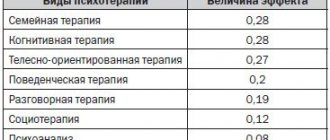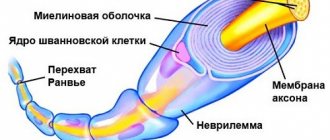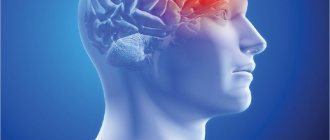A nervous breakdown is an acute condition resulting from prolonged or excessive nervous strain.
In medicine, the term “nervous breakdown” is not used, but most people have, to one degree or another, encountered a situation when they know for sure that they are “on the verge.” One more drop or word - and there will be a storm or complete inner devastation.
New in the treatment of nervous disorders abroad in women, men and children
Psychotherapy – thanks to group or personal consultations with a doctor, it is possible to develop competent behavior in circumstances of stress, overcome manifestations of disorders, change attitudes towards oneself, and the general state of affairs.
Relaxation techniques help reduce muscle tension, provide an opportunity to relax, and get rid of constant thoughts. Such techniques include the possibility of meditation, yoga, massage, certain types of treatment with mineral waters, color and aromatherapy.
Physical activity, a healthy lifestyle - the role of these components in the treatment of nervous disorders in women and men is only growing. Sports exercises improve mood, promote the quality of the cardiovascular system (significantly affected in nervous disorders), increase the production of serotonin (a neurotransmitter necessary for the quality of functioning of the brain), and improve sleep.
In addition, for such problems, as in the treatment of mental disorders, they resort to drug treatment, using in particular:
- Drugs with additional sedative effects. Many signs of a nervous disorder—head pain, rapid heartbeat—can be relieved with medications designed to solve a specific problem.
- Medicines based on plant extracts (valerian, motherwort, lemon balm, chamomile, etc.).
- Complexes of vitamins and minerals. In a stressful state, vitamins B, E, calcium, and magnesium are especially important.
- Homeopathic medicines, dietary supplements - most often they contain extracts of invigorating (ginseng) or calming (chamomile, lemon balm) effects.
- Prescription drugs are powerful drugs, they are prescribed by a doctor, and they are also taken only under medical supervision: antidepressants, antipsychotics, tranquilizers, which have a variety of side effects and a number of contraindications.
- Non-prescription drugs that have a complex therapeutic effect, improve sleep, memory, performance, mood, and relieve anxiety.
Symptoms and signs of male neuroses
Let's look at neurosis, its symptoms and treatment in men. There are several different symptomatic groups. Non-physical indicators include:
- emotional breakdown - in the absence of any reasons for this; excessive vulnerability, touchiness for no reason, any situation can lead to tears or an aggressive reaction;
- excessive irritation, feeling of dissatisfaction;
- difficulties in decision making;
- problems arise in the usual social circle;
- instability to stress - if something goes wrong, the infected person falls into despair;
- mental abilities and memory decrease;
- difficult to focus on work tasks;
- it is not possible to sleep normally due to brain excitement - in the morning there is no vigor, one feels drowsiness and fatigue, insomnia;
- manifestation in the form of atypical fear, phobia, anxiety;
- panic attacks that have not been observed before;
- disruption of relationships with others;
- bad thoughts that haunt you.
Psychasthenia causes not only pronounced problems. In difficult circumstances, unfavorable conditions appear:
- decreased potency and libido, sexual dysfunction;
- frequent causeless headaches, increased blood pressure;
- pain in the abdomen, stomach;
- darkening of gases during sudden movements;
- loss of appetite;
- increased fatigue;
- decreased overall performance; dizziness;
- vegetative-vascular dystonia;
- difficulty sleeping – it’s difficult to fall asleep, you still feel tired in the morning;
- disturbances of autonomic functions - difficulty with bowel movements, painful urination, palpitations, tendency to sweat.
The individual retains functionality. He is fully aware of his situation, but is unable to do anything on his own. It is important to choose the moment to get to the doctor in a timely manner. Otherwise, the development of deep depressive symptoms, phobias, panic attacks, and deterioration of physical health is possible.
Representatives of the stronger sex are less susceptible to the disease than the weaker sex, but there are some risks. Age plays an important role. After forty years, deep hysterical and neurotic states are possible, which are difficult to overcome on your own.
The secret of effective treatment of nervous disorders in Israel
Israeli neurology, thanks to advanced developments in the medical field, provides the most effective treatment for many diseases that were previously considered incurable. Specialists with extensive experience and deep practical experience and knowledge are able to analyze patient complaints to the smallest detail, which makes it possible to promptly detect even serious malfunctions in the functioning of the nervous system. Thus, the staff of the Renaissance drug treatment clinic conducts a full examination using the most advanced equipment. Innovative technologies help make an accurate diagnosis and prescribe effective treatments.
Each stage, as in the treatment of drug addiction in Israel, occurs under the strict supervision of a doctor who is personally assigned to each patient. Thanks to this, treatment can be adjusted at any time, which increases efficiency and speeds up the patient’s recovery.
How to overcome a nervous breakdown and undergo treatment in Moscow
When a breakdown occurs, the best way out of it for the “breakdown” person is to experience his situation completely, that is, there is no need to push emotions inside, suppressing them within himself. It’s better to take them out, because periodic discharge is simply necessary. If you feel that a breakdown is close, but it hasn’t happened yet, try to switch to something and get distracted. The guideline here could be the following: the higher the tension inside, the more powerful the way to escape should be.
If you have any guesses about what caused it, try to eliminate or at least weaken such a source of tension. In situations where you do not know what the cause of the situation is, it is recommended to seek support from an experienced psychotherapist. The problem is that people clearly understand when treatment for drug addiction or other pathological addictions is required, and do not attach much importance to disorders of this type and psychological aspects in general. The big mistake of those who are faced with a situation of this kind is to ignore the problem itself in the expectation that everything will go away on its own, but this is not the case. Even if a nervous breakdown does not leave any mental consequences, it can still cause significant damage to health. That is why, with such a problem, there is no need to engage in independent treatment; it is better to seek help from a specialist. In Moscow, the best place to help you with nervous disorders and breakdowns is at the Renaissance RC, which is a branch of an international network of clinics.
Nervous breakdown symptoms
A nervous breakdown affects everyone differently. For some, excitation reactions predominate: screaming, aggression, tears, hysteria, motor agitation. Others, on the contrary, experience a state of stupor, a feeling of the unreality of what is happening, a complete lack of emotions and feelings, a loss of strength, a desire to lie down, hide and not have any human contact.
A nervous breakdown is accompanied by low mood, anxiety, insomnia, as well as unpleasant bodily sensations, tachycardia, and pain in various parts of the body.
Compare prices for treatment of nervous disorders in the best clinics
As in the treatment of addictions, the variation in prices between clinics in different countries and even cities is quite significant:
- Thus, a consultation with a psychotherapist or neurologist in St. Petersburg will cost approximately 1000-1500 rubles;
- in Moscow, prices for a similar service usually start at 2,000 rubles.
In Israel, the cost of a consultation will range from $200-400, however, the quality of treatment is much higher, including due to a change of environment and the opportunity to combine a course of therapy with rest.
Read reviews about the treatment of nervous disorders
“A couple of months ago a difficult period began in my life. Troubles during the workday were accompanied by difficulties at home. I realized that it was time to change something or at least take a break. I had the opportunity to go on vacation and I took it. I went to Israel, where I decided to turn to specialists, because I felt that when I returned home, I would encounter the same difficulties. Prof. worked with me. Drori Vivian, a specialist in the field of neurology with extensive experience. I am very glad that I turned to a pro. After just a few sessions, I felt relief and began to understand what exactly didn’t suit me and how to deal with it. Thank you doctor!”
Yaroslava Zaichenko, Belgorod
“I heard a lot about treatment in Israel, but I always believed that it was more relevant for major medical problems, complex diseases, treatment of alcoholism, etc. Therefore, when the issue of a nervous disorder arose in my life, on the one hand, I understood that I wanted to get the most qualified help, but on the other hand, I was not ready to go abroad with a problem like mine. And here it came to the rescue that in Moscow there is a branch of a well-known network of clinics - Renaissance RC. They really helped me here, now I feel calmer about the circumstances and know that in a pinch I will always be supported.”
Vladimir Davidov, Moscow
“What’s happening to me?”: 16 signs of a nervous breakdown that require help
Author:
Bondar Yulia
3 minutes
11465
Although the term was once used to refer to a wide range of mental illnesses, in modern medicine there is no such “diagnosis” anymore.
However, the so-called "nervous breakdown" remains a symptom of mental disorders such as depression, anxiety disorder, and post-traumatic stress disorder, or PTSD. It may accompany the acute phase of a particular disorder.
16 signs of a nervous breakdown
Because the condition is not associated with any specific disease, a nervous or mental breakdown does not have any specific symptoms other than the inability to function “as usual.” And this normal mode of functioning varies markedly across cultures, regions, and even families. However, there are 16 common symptoms typical of this condition:
- feeling anxious, depressed, tearful, or irritable;
- feeling of helplessness, hopelessness;
- low self-esteem;
- avoidance of normal social situations;
- sleep problems – insomnia or excessive sleepiness;
- craving for unhealthy habits and problems with hygiene;
- difficulties with concentration and memory;
- emotional or physical exhaustion, often without external cause;
- lack of motivation and interest in life;
- inability to derive pleasure or satisfaction from things that previously brought joy or satisfaction;
- unexplained pain and general malaise;
- difficulties communicating with other people;
- suicidal thoughts or thoughts of self-harm;
- lack of interest in sex;
- slowness;
- frightening memories, nightmares, panic attacks.
In extreme cases, especially in mental conditions associated with psychosis, symptoms may also include hallucinations, paranoia, and delusions.
When to see a doctor
You should talk to your doctor as soon as physical or emotional stress begins to interfere with your daily life or normal activities. But, unfortunately, often people experiencing a so-called nervous breakdown cannot recognize its symptoms, nor understand that they need professional help.
Unfortunately, many people are reluctant to seek mental health help due to fear of being judged. They may also believe that everything that happens to them is their own fault and that they cannot be helped.
If your close friend or relative is showing one or more signs of a nervous breakdown, they should be encouraged to seek medical help.
Treatment and prevention
There are several ways that can help reduce symptoms of emotional and physical stress. Common treatment and prevention strategies for nerve disorder include:
- counseling, usually cognitive behavioral therapy;
- reducing or eliminating sources of stress such as conflicts at home or in the workplace;
- exercises to maintain mental and physical relaxation, such as deep breathing and meditation;
- 20 minutes of moderate-intensity exercise daily, or 10 minutes of vigorous-intensity exercise daily;
- hobbies that encourage getting outside;
- communication with friends, family, partners about your feelings and emotions;
- establishing and maintaining a strict daily routine, special attention to hygiene, sleep and nutrition;
- finding local or online support groups for people with similar symptoms;
- creating a zone of special calm without distractions to improve sleep quality
- avoidance of caffeine, alcohol and nicotine
The use of antidepressants or antipsychotic drugs may be effective, but should only be prescribed by a doctor.
Causes and risk factors
Anything that causes increased emotional and physical stress can lead to nervous breakdown or cause symptoms of a “nervous breakdown.” But there are certain situations, genetic factors and experiences that are more likely to be associated with a nervous or mental disorder than others.
Causes and risk factors for nervous disorders include:
- intense grief;
- traumatic experience;
- being in an abusive relationship;
- high stress at work;
- emotional burnout at work;
- family history of mental disorders;
- insulation;
- serious social conflict, especially if it affects work and home life;
- severe or chronic illness or injury.










